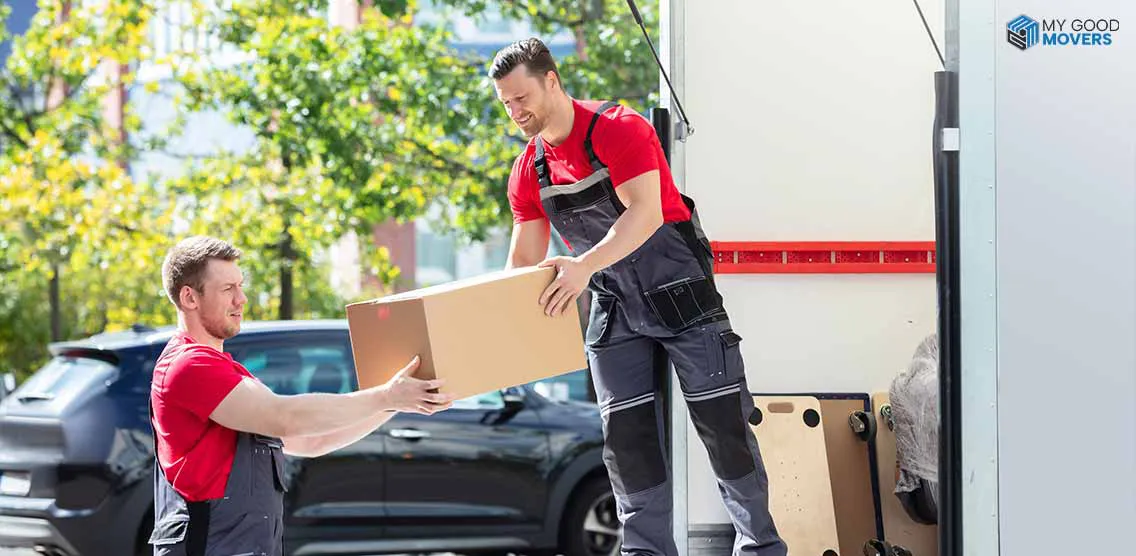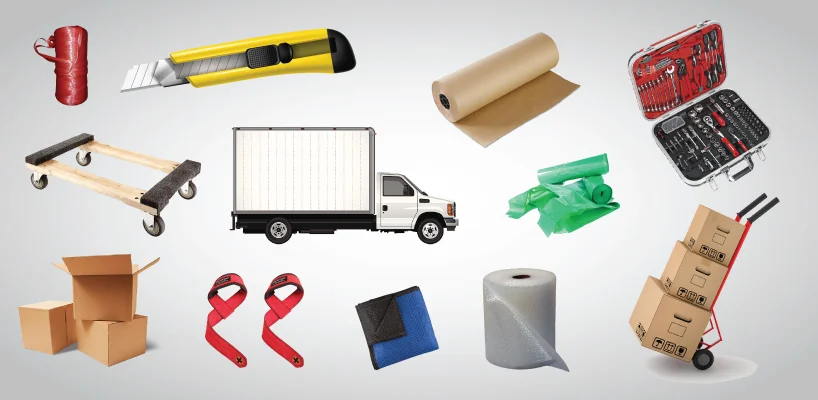They say moving is one of the most stressful things you can do. But what if we told you that it's not just the packing and heavy lifting that could stress you out, but the fear of getting scammed as well?
Imagine this: you’ve found your dream home, you're all packed up, and everything is ready for the big move. But what if the moving company you hired isn't exactly who they say they are? What if you end up becoming a victim of moving fraud?
It sounds like a nightmare.
Moving fraud is on the rise. The Federal Motor Carrier Safety Administration (FMCSA) reported a staggering 12% increase in moving fraud cases over the past year.
Also, scams related to moving companies cost U.S. consumers over $8 million in the previous year.
Now, that’s enough to make anyone nervous about their upcoming move.
So, what can you do to avoid this nightmare?
How can you spot moving fraud scams before they catch you off guard?
Well, you’ve come to the right place! Let’s guide you step-by-step on how to avoid these scams, spot the red flags, and, in the unfortunate event that you fall victim to moving fraud, what steps you can take to get your stuff back.
What Exactly Is Moving Fraud?
Before we discuss how to spot it, let's first clarify what moving fraud is.
Moving fraud happens when dishonest moving companies try to scam people by overcharging, mishandling belongings, or even outright stealing them.
These fraudsters lure you in with super-low quotes, but once they’ve got your stuff in their hands, they start hiking up the price or delay delivery. And some of them don’t even show up to move your things at all!
If you’ve ever heard a horror story from a friend or family member about how their move turned into a nightmare, there’s a chance they were scammed by a fraudulent moving company.
But if you're aware of the red flags, you can avoid it happening to you.

Avoid moving scams and reach out now to find a trustworthy moving company!
How to Spot Moving Fraud
Let’s get into how you can spot moving fraud before it’s too late. The last thing you want is to get stuck with a shady company that leaves you high and dry.
Here’s what you should keep an eye out for:
Suspiciously Low Quotes
You get a quote that’s lower than all the other estimates. It sounds like a steal, and it probably is because scammers attract people with shockingly low prices.
These moving fraud scams are designed to look too good to pass up. But once they’ve picked up your stuff, the company will jack up the price and claim there were unexpected costs or additional fees.
What you can do: Get at least three estimates, and make sure they’re in writing. If one estimate is way lower than the others, run in the other direction.
Why You Can Trust My Good Movers
550+
moving companies
listed
16,000+
customer reviews to help you decide
50+
states covered for moving services
100%
free quotes provided instantly
They Don’t Want to Visit in Person
If a moving company refuses to send someone out to assess your belongings, that’s a huge red flag. Legit companies will send a rep to your home to do an in-person inspection, so they can give you an accurate quote.
What you can do: Always insist on an in-person estimate. If a company insists on giving you a quote over the phone without seeing your items, don’t trust them.
No Physical Address
If you can’t find a physical address for the company or they only offer a P.O. Box, it’s time to be skeptical. A reputable moving company will have a brick-and-mortar office you can visit.
What you can do: Look up the company’s address online and verify it through a map search. If the address is nowhere to be found, or it’s just a P.O. Box, discard the company.
Demanding a Big Deposit Upfront
A reputable moving company might ask for a small deposit, but if they’re asking for a large sum of money upfront, that’s a major red flag. Scammers typically demand cash before the move, leaving you with no recourse if they don’t show up or damage your belongings.
What you can do: Stick to paying via credit card or check and only pay a reasonable deposit. No large upfront payments!
No Written Contract
If the company refuses to provide a written contract or doesn’t want to outline the details of your move, that’s a huge warning sign. Without a contract, you have no proof of the agreed-upon services or costs.
What you can do: Always get everything in writing, including services, costs, delivery timelines, and any other agreements. If they won't, move on.

Want to dig deeper into how to avoid fraud and ensure you're hiring trustworthy movers? Learn How to Know if a Moving Company is Legitimate
The Impact of Moving Fraud in the U.S.
To really drive the point home, let’s look at some stats. Moving fraud is a bigger problem than most people realize.
In the previous year, the Federal Motor Carrier Safety Administration (FMCSA) reported a 12% increase in moving fraud complaints.
These scams cost consumers millions of dollars every year. The sad part is that many people don’t even realize they’re being scammed until it's too late.
In recent years, moving scams led to $8 million in losses. So, it’s a real issue, and you don’t want to be part of those statistics.

Don’t let moving fraud ruin your day! Check out our moving tips for a smooth, stress-free move.
How to Protect Against Moving Fraud
Now that you know how to spot the fraudsters, let’s talk about how you can protect yourself from moving fraud complaints before they even happen.
Do Your Research
Don’t skip the background check! Look up reviews on Google, BBB, and My Good Movers. Check their ratings and see what others have said about their experience.
What you can do: Read moving fraud reviews carefully and see if others have reported any shady business practices. If there are lots of negative reviews, trust your gut and don’t hire them!
Use a Professional, Licensed Mover
Always choose a licensed and insured moving company. The FMCSA provides a list of registered and legal moving companies that you can check out. They're the gold standard for ensuring that your moving company is trustworthy.
What you can do: Look for a moving company that is registered with the FMCSA and has all necessary licenses. You can verify this on the FMCSA website.
Get Everything in Writing
This should go without saying, but we’ll say it anyway: get everything in writing. If a company promises one thing but doesn’t put it in a contract, there’s a good chance they’re not being upfront with you.
What you can do: Insist on a clear, written contract with all services, costs, and expectations outlined. If they won’t provide one, that’s a clear sign to walk away.
Avoid Paying Large Cash Deposits
A legitimate moving company will never ask you for a huge deposit upfront. Stick to credit card payments and only pay a reasonable deposit.
What you can do: Use a traceable payment method like credit cards to protect yourself. If you get scammed, you may have more luck disputing charges.

Still worried about getting stuck with a bad moving company? Check our post on Worst Moving Companies - How to Identify, Avoid, and Handle Them.
What to Do if You’re a Victim of Moving Fraud
Let’s say it’s too late, you’ve already fallen victim to a moving scam.
Here's what you should do:
Step 1: Contact the Moving Company Directly
The first thing you want to do is contact the moving company. Maybe there's been some kind of misunderstanding or a logistical issue. Sometimes, a quick call or email can resolve the problem without too much stress. But don't just take their word for it; be firm and clearly explain what went wrong.
Step 2: Document Everything
Document absolutely everything. The more you can show that you've tried to resolve the issue and that things weren’t handled properly, the stronger your case will be. Take photos of any damaged or missing items, and keep a record of every conversation, email, or written communication you have with the company.
Step 3: File a Complaint with the FMCSA and the BBB
If you can’t work things out directly with the company, it’s time to get the authorities involved. Start by filing a complaint with the Federal Motor Carrier Safety Administration (FMCSA). They regulate moving companies, so they can investigate your claim and possibly take action.
Don’t forget the Better Business Bureau (BBB). They handle consumer complaints and can help mediate between you and the company. You'll also want to contact your state's consumer protection office. They have specific resources for people dealing with fraud in their state and can offer further assistance.
Step 4: Check Your Moving Insurance
If you bought moving insurance, check if your policy covers fraud or mishandling of your belongings. Some policies might help you recover your costs, especially if the company’s negligence or dishonest practices led to damage or loss.
If you’ve got coverage, get in touch with the insurance provider and file a claim.
Step 5: Dispute Credit Card Charges
Now, if you paid for the move using a credit card, don’t wait! Get in touch with your credit card company and dispute the charge. A lot of credit card companies have policies that protect against fraudulent transactions, so they might be able to reverse the charge for you. They’ll likely ask for supporting documentation, so make sure you’ve got that ready.
Step 6: Seek Legal Advice
If you’re really getting the short end of the stick, it might be time to consult a lawyer who specializes in moving fraud legal advice or consumer protection. A legal expert can help you understand your rights and possibly recover your lost belongings or money.
Step 7: Share Your Story and Warn Others
Once you've handled everything on your end, it’s time to spread the word. Leaving reviews on Google and My Good Moves can help others avoid the same company. Be honest and share all the details of your experience so others can benefit from your warning.

Want to make sure your movers are legit? Learn how to verify their credentials by checking their USDOT number.
Moving Fraud - Real-Life Story
We know you're thinking, "How do I know this is real?" Well, here are real-life case studies that'll make you think twice before hiring just any moving company.
Case Study: The $1,000 Estimate that Turned into a Nightmare
A family from New Jersey had been planning their big move to a new home across town. They were excited but, like everyone else, stressed about the costs. They did their homework and found a moving company that seemed perfect; low prices, good reviews, and they promised to get their things to their new home safely.
The company gave them an estimate of $1,000 and told the family that they had some flexibility in their pricing, depending on the amount of stuff being moved. The family thought, "This sounds pretty reasonable. We’re on a budget, and this could be the one!"
Everything went smoothly at first. The movers showed up on time, packed the truck, and began loading the family’s belongings. The movers seemed professional, and the family felt relieved—they were on their way.
Then, just as the truck was loaded and about to head out, the movers dropped a bombshell. They handed the family a new estimate. They told them that the $1,000 estimate was just for the packing and loading, and now they needed to pay an extra $2,500 to actually get their things delivered to their new home.
The family was stunned. They had no idea the price would be this high, and frankly, they didn’t have the extra money. But what could they do? They were holding the family’s entire life hostage in that truck. They had no choice but to fork out the extra $2,500.
At the end of it all, the movers dropped off their things at the new house, but the family was left feeling completely betrayed. After the whole ordeal, they reported the company to the Better Business Bureau (BBB) and My Good Movers, warning others about the company’s misleading pricing practices and aggressive tactics.
But by the time they got their belongings back and filed the complaint, they were out a lot more money than they ever expected.
Don’t Get Scammed!
Moving fraud doesn’t have to happen to you. If you take the time to do your research, stay vigilant, and follow these tips, you can easily avoid falling into the trap of a fraudulent moving company.
Remember, it’s all about protecting against moving fraud before it starts. Don’t let anyone take advantage of you, and always trust your gut.
Recommended Resources:















































 (239) 799–6077
(239) 799–6077